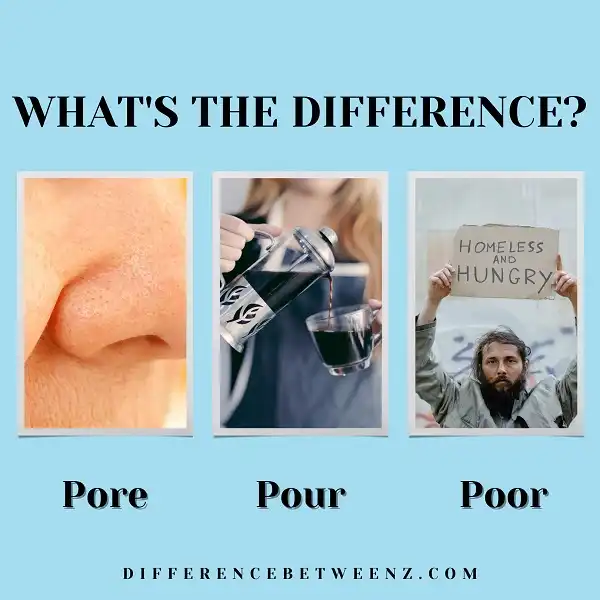There is a big difference between pore, pour, and poor. Many people use these words interchangeably, but they actually have different meanings. In this blog post, we will take a closer look at the definitions of each word and give some examples of how to use them correctly. Are you ready to learn more? Let’s get started!
What is Pore?
Pore is a small opening in the skin that releases sweat and oil. The size of the pores is determined by the amount of oil produced by the sebaceous glands. Pores can become clogged with sebum, dirt, and dead skin cells, which can lead to blackheads, whiteheads, and acne. Pore size can also be affected by aging, sun damage, and genetics. There are many products on the market that claim to reduce pore size, but these claims are not backed by scientific evidence. The best way to reduce the appearance of pores is to keep the skin clean and free of oils and debris. Exfoliating regularly can also help to unclog pores and prevent build-up.
What is Pour?
Pour is a word with many meanings. It can be used as a verb, meaning to “cause (a liquid) to flow or leave a container,” as in “she poured some milk into the bowl.” It can also be used as a noun, referring to the act of pouring or the amount that is poured, as in “a Pour of milk.” Pour can also be used figuratively, to mean “to bestow (something) abundantly or profusely,” as in “she poured her love into her work.” Finally, Pour can be used to describe a heavy rain, as in “it was pouring outside.” As you can see, Pour is a versatile word with many different uses. Whether you’re talking about literal or figurative pouring, Pour is sure to communicate your meaning clearly.
What is Poor?
- Poor has many definitions. In the simplest of terms, poor is the state of being without money or possessions. But poverty is much more complex than that. Poor may also mean lacking in certain qualities or attributes, such as strength, intelligence, or emotional well-being.
- It can also refer to a person who is considered to be lower in social class or lacking in social status. Poverty can be relative, as well. For example, someone who lives in a wealthy country but doesn’t have much money might still be considered poor.
- In general, though, poverty is about more than just a lack of money. It’s about a lack of resources and opportunities that can lead to a feeling of powerlessness and despair. And it’s an issue that affects millions of people around the world every day.
Difference between Pore, Pour, and Poor
- Pore, pour, and poor are three words that are often used interchangeably, but there are subtle differences in their meanings. Pore most commonly refers to a small opening in the skin, Pour is used when referring to the act of liquid flowing And Poor typically signifies a lack of something.
- For example, you might say that you need to pore over a book to study for an exam, pour yourself a cup of coffee, or that you feel poor because you can’t afford a new car.
- Although these words have different connotations, they all share the common thread of being related to some sort of hole or opening. Pore and pour both have literal holes that things can enter or exit, while poor references a metaphorical hole in someone’s wealth or possessions. Ultimately, whether you’re describing a tiny skin opening or a large financial gap, these three words can help you communicate what you mean.
Conclusion
We hope that this post has helped clear up any confusion you may have had about the difference between pore, pour, and poor. Keep in mind that there is no wrong or right answer when it comes to using these words correctly – as long as you are using them accurately and consistently with your audience, you’re good to go!


